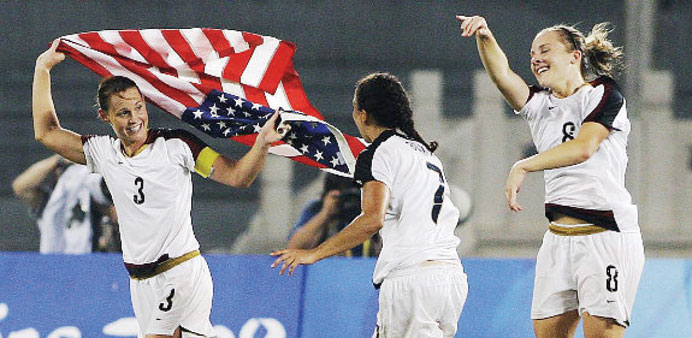COUNTRY COMES FIRST: Christie Rampone (left), Shhannon Boxx (centre) and Amy Rodriguez have been forced to stay away from their children because of the World Cup
By Les Carpenter in Vancouver/theguardian.com
The youngest members of the US women’s soccer team fly on team flights and stay in team hotels throughout the year. They run tirelessly in practice, rolling across fields, always ready to offer hugs and high-fives.
The youngest members of the US women’s soccer team are also the most popular members of the team, loved by all and endlessly doted upon at team meetings, dinners and social gatherings.
Until the World Cup.
When World Cup comes, the US team’s most adored members are no longer welcome at the team hotels, they can’t eat at team meals and they are kept far, far away from those practice fields they like to roam.
In a ritual most sports fans never witness, the youngest members of the US women’s soccer team are sent away in the frosty name of business. Their mothers must work now, and the children have to go away.
“It’s tough, but it’s my job, you know, and I enjoy it and I love it and they understand,” US defender Christie Rampone said on Friday, two days before USA meet Japan in the women’s World Cup final.
Soccer’s most cherished trophy comes at a price many women would never want to pay.
The pursuit of a World Cup requires the three mothers on the US team to leave their children with husbands and parents, seeing them but for an hour each day before sequestering away in a secure hotel far from scraped knees and cries in the night.
For Rampone, the separation is easier. Her daughters Rylie and Reece are nine and five, and old enough to understand the difference between a road trip on a soccer friendly and the most important games in their mother’s life.
But for the other two US players with children—Amy Rodriguez and Shannon Boxx—the goodbyes have to be that much harder.
Rodriguez’s son, Ryan, is just one-and-a-half, while Boxx’s daughter, Zoe, is barely more than a year old.
The other day, former US player Julie Foudy and former teammate Kate Markgraf—who is working with Foudy on ESPN’s World Cup coverage—were looking at a picture of Rampone saying goodbye to her daughters.
Markgraf, who had two children during her playing career, knew instantly the emotion on Rampone’s face.
“She said that was the hardest moment,” Foudy recalled. “You are training for the World Cup and you are away from your children, that’s hard. But you are pursing a dream and this is what you have to do.”
Rodriguez and Boxx were not in the group of players the US provided at its pre-final press briefing, held after Friday’s team practice.
Given that several players not at the press conference were seen on nearby sidewalks at that time it is likely this might have been their only opportunity to see their children. But Rampone, the team’s oldest player at 39, can explain all too well the heartbreak of leaving her children and the need to do so.
“I see them every day,” she said. “They’re in a different hotel. We have friends and family time that we can go out and see them for an hour or two and then come back and take care of ourselves.
“We work so hard and we don’t want to have any distractions. You put four years into it and you get here and it’s like this is what you work so hard for. It’s a conversation I have with the kids. They get it and they understand it.”
To an outsider, the process must seem cold. Through practice camps, exhibition trips and workout sessions, the children are a cherished part of the team. US Soccer provides nannies and offers as much support as possible to its mothers.
“All the kids on the team have 23 aunts who are ready to play with them, and when it’s time to change a diaper you give them back,” midfielder Heather O’Reilly said. Everyone is happy.
Then when World Cup comes, the children must go.
But this is a reality of women’s sports, and an increasingly common one as more female athletes realize they can have children, recover with expensive training and compete again just a few months after giving birth.
Foudy remembers when teammates Joy Fawcett and Carla Overbeck had children back when all of them were still playing and members of the national team. The sudden appearance of toddlers made the team feel more like a family. “A big old family circus,” she says.
Fawcett and Overbeck’s children became almost like her own children and everyone else’s children. They played and sang and did everything together—adults and kids alike.
When Fawcett’s oldest daughter Katelyn Rose, turned 21 in May, Foudy said she and her former teammates texted and emailed all at once screaming: “Oh my gosh, where did the time go?”
“Now she’s old enough to drink,” Foudy said with some wonder in her voice.
The family is smaller now. A World Cup final looms. The children are gone, safe with grandparents. Dirty diapers will have to wait. There’s a certain gold trophy to be won. Not even a baby can stand in the way of that.

